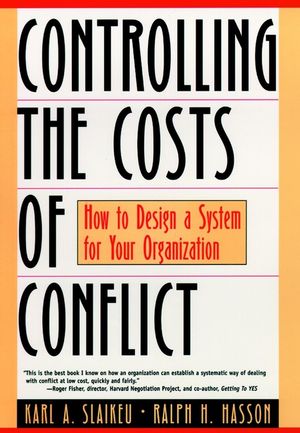Controlling the Costs of Conflict: How to Design a System for Your OrganizationISBN: 978-0-7879-4323-3
Paperback
256 pages
November 1998, Jossey-Bass
 This is a Print-on-Demand title. It will be printed specifically to fill your order. Please allow an additional 10-15 days delivery time. The book is not returnable.
|
||||||
Introduction.
The Hidden Culprit of High Costs: Weak Systems.
First Principle: Acknowledge Four Ways to Resolve Conflict.
Defining Four Options.
Weighing Costs and Risks of Each Method.
Choosing an Approach to Conflict Management.
The Preferred Path for Cost Control.
Second Principle: Create Options for Prevention and EarlyIntervention.
A Template for All Organizations.
Applying the Template: Real Stories.
Third Principle: Build Collaborative Strength Through SevenCheckpoints.
Seven Checkpoints.
Clarify Policy.
Define Roles and Responsibilities.
Revise Documents.
Establish Selection Criteria.
Provide Education and Training.
Strengthen Support Systems.
Evaluate the System.
Fourth Principle: Use the Mediation Model to Build Cosensus AmongDecision Makers and Users.
Assumptions About Change.
Phase One: Draft a Blueprint.
Phase Two: Implement the Plan.
Phase Three: Review the System Annually.
Conclusion.
Conclusion: A Vision for Your Organization.
Resource A: Glossary.
Resource B: Ombudsman Code of Ethics and Standard Practices.
Resource C: Skills Courses.
The Hidden Culprit of High Costs: Weak Systems.
First Principle: Acknowledge Four Ways to Resolve Conflict.
Defining Four Options.
Weighing Costs and Risks of Each Method.
Choosing an Approach to Conflict Management.
The Preferred Path for Cost Control.
Second Principle: Create Options for Prevention and EarlyIntervention.
A Template for All Organizations.
Applying the Template: Real Stories.
Third Principle: Build Collaborative Strength Through SevenCheckpoints.
Seven Checkpoints.
Clarify Policy.
Define Roles and Responsibilities.
Revise Documents.
Establish Selection Criteria.
Provide Education and Training.
Strengthen Support Systems.
Evaluate the System.
Fourth Principle: Use the Mediation Model to Build Cosensus AmongDecision Makers and Users.
Assumptions About Change.
Phase One: Draft a Blueprint.
Phase Two: Implement the Plan.
Phase Three: Review the System Annually.
Conclusion.
Conclusion: A Vision for Your Organization.
Resource A: Glossary.
Resource B: Ombudsman Code of Ethics and Standard Practices.
Resource C: Skills Courses.



